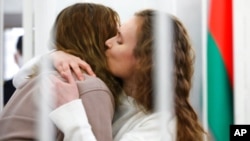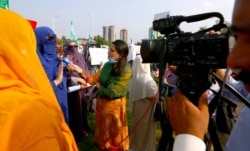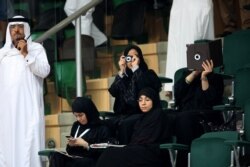Media restrictions imposed during the pandemic, protests that threaten the safety of reporters, a high number of jailings — these kinds of attacks on press freedom in the Middle East are on the rise and increasingly affect female journalists, a media group found.
In its May 2021 report, the Coalition for Women in Journalism documented 348 cases of threats and violence against female journalists globally in the first quarter of the year, a significant increase from the same time period last year.
The nonprofit, which tracks attacks, threats and harassment against women who work in journalism, said countries in the Middle East and North Africa were among the most dangerous.
Iran accounted for the most jailings, with 11 of the 48 journalists detained as of May.
Alongside crackdowns affecting media in Belarus and Myanmar, the report cited cases of women being detained or harassed in Saudi Arabia, Turkey, and Egypt.
The findings formed part of a discussion on “The Most Urgent Issues for Arab Women,” hosted by the coalition in late May, that featured Lebanese freelancer Luna Safwan, journalist and blogger Maysaa Al-Amoudi, and Egyptian-American journalist Reem Abdellatif.
Opposition, cultural issues
Held over Twitter Space by Kiran Nazish, an award-winning journalist and founding director of CFWIJ, the panel discussed navigating harassment and censorship, while pushing back against cultural expectations.
Al-Amoudi has worked for media in the Middle East and U.S. for more than a decade and advocated for women’s right to drive in Saudi Arabia. She now works as a blogger and columnist with the independent news website Daraj, which focuses on gender, minority rights and environmental issues.
“I believe that threats of government or authorities are the biggest issue for journalists,” Al-Amoudi told VOA in an email interview after the panel. “Most of the politicians don't favor you as long as you are a feminist journalist.”
Female journalists provide a powerful and unique perspective in the Middle East, Al-Amoudi said, adding that having more in journalism would help make the press more balanced.
While working at Arab-language news outlets, Al-Amoudi said, she saw how networks sought to control the appearance of female broadcasters. Male and female colleagues also appeared to have an unequal footing, with women on air during the least watched hours, Al-Amoudi said.
Despite the challenges, women have been able to report on stories often missed in the mainstream, said CFWIJ director Nazish. “When they're telling a story, it's an urgent story. If they're talking about an issue, these are urgent issues, and we need to pay attention to that.”
"These women are powerful in telling the story because they are bolder as well,” Nazish told VOA.
New narrative
During the panel, Abdellatif, co-founder of African Women Rights Advocates, a survivor-led movement that supports and advocates for women and girls across Africa, spoke about the important role women can play by providing a new narrative. She said it helps to hold accountable those who seek to silence and threaten women’s voices.
Abdellatif and her co-panelists emphasized a need for fostering connections and solidarity among women in the media.
It’s an ideal central to the CFWIJ, which shares resources, helps journalists get support, documents attacks and, in extreme cases, helps journalists to relocate, Nazish told VOA.
By organizing discussions among women journalists, the CFWIJ highlights their experiences and provides an additional platform for their voices.
Conversations like these are useful, Al-Amoudi said, but more work needs to be done on building connections among women in the press.






